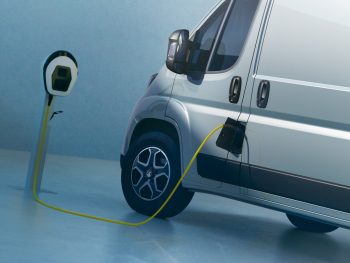A 2030 ban on new ICE van sales would be unachievable, while the same target for cars is a major risk without additional support measures, the BVRLA has warned.

Speaking ahead of a Department for Transport (DfT) consultation on plans to move the 2035 ICE ban back to the original 2030 date, the rental and leasing industry body said a raft of extra measures would be needed to ensure the UK reaches Labour’s ambitious targets.
The BVRLA also warned that a 2030 phase-out target for banning new ICE van sales – where the Government’s position remains unclear – was unachievable.
The comments come after the Government said last month that it would stick to its manifesto commitment to reinstate the 2030 phase-out for new petrol and diesel cars following the former Conservative government’s rowback.
Speaking last month, a DfT spokesperson said: “We’re committed to delivering greener transport by supporting the transition to electric vehicles.
“This includes phasing out the sale of new petrol and diesel cars by 2030 and accelerating the rollout of charge points. We will set out more details in due course.”
A consultation is expected to start later this month and will likely focus on defining what specifications a car or van must have to be officially categorised as a ‘hybrid’ which can continue to be sold from 2030-2035. In conjunction with the ZEV mandate, the phase-out timings create a period from 2030-2035 where it is currently unclear which non-ZEV models could be sold in the UK.
Gerry Keaney, BVRLA chief executive, said: “The ZEV mandate timetable and 2030 phase-out target for cars present a major risk unless we see much greater government support to stimulate new and used BEV demand and better charging infrastructure.”
The consultation is expected to cover vans as well as cars – and the BVRLA via its involvement with the Zero Emission Van Plan has been spotlighting the challenges facing electric van adoption with industry and government.
“When it comes to electric van adoption, the lack of suitable BEV LCV product in – or about to hit – the UK market means the fleet sector will not be able to reach a 2030 phase-out target,” added Keaney.
Ahead of the consultation, the BVRLA will run a major month of campaigning, sharing member views with MPs, policy makers and industry stakeholders. This includes a Parliamentary Reception (10 September), the launch of an exclusive report into the used BEV market and support required (17 September), plus an active presence at the Labour and Conservative party conferences (both late September).
Government must make 2030 position on vans clear as soon as possible, says FleetCheck

FleetCheck has also warned about major challenges with electric van adoption as it stresses that the Government must make clear its position on the diesel van ban clear.
Like the BVRLA, FleetCheck has spoken out about the significant practical issues with eLCV rollout faced by fleet operators.
Peter Golding, managing director at the fleet software specialist, said: “While electric car adoption by fleets has generally been a considerable success and the 2030 phase-out is absolutely viable, almost the opposite is true of electric vans.
“Compromises over range, payload and charging times mean that fleet sales of new electric vans are struggling to rise above 5% and there appears to be limited prospects of this changing dramatically unless that is some kind of unforeseen paradigm shift.”
Golding added that fleet experiences had shown that electric van use for anything other than local, light duty work was questionable and any change to the diesel van ban could leave fleets in an “impossible” situation.
“Fleets are looking at the ZEV mandate – which will see electric van production rise from 10% of sales this year to 70% by 2030 – alongside the potential 2030 production ban, and they just can’t foresee how the situation is going to be resolved.
“This is not a scenario where fleets are against zero-emissions vehicles – almost all want to play their part in creating cleaner air and minimising the impact of climate change – but they believe that the electric vans on offer currently are simply not fit for their needs.
“For many fleets, 2030 is less than one typical van replacement cycle away, and the lack of certainty is leaving them in an almost impossible situation.”
Golding said there was a credible argument that the 2030 ICE ban on vans was essentially symbolic anyway, given the planned impact of the ZEV mandate on diesel van availability.
“However, almost no-one I speak to in the fleet sector seems to think that the van ZEV mandate can be maintained. You cannot force companies to buy vehicles they don’t want. Certainly, we speak to more fleets that are planning to continue to operate diesel vans in perpetuity than those who see electrification from 2030 as a viable option.”
FleetCheck suggested three potential solutions to move the dial substantially: taxation changes to give an undeniable incentive for van electrification in the same manner as Benefit-in-kind Kaxation has done for electric cars; a massive improvement in electric van technology; or dramatically lower electric van pricing.
“The fact is that none of these developments are likely to happen, at least by 2030. There are not really any carrots that the Government or manufacturers can offer that look likely to change the mind of fleets who are dead set against electrification on practical grounds.”
One other option would be for the Government to effectively “tax diesel vans out of existence” but Golding said that given the level of resistance from businesses, the VED rate imposed would have to be very high rather than simply tweaked.
“The question is whether the Government would want to pursue what is likely to be a deeply unpopular policy.”
Golding said the best option at this point in time would be for fleets and operators to use the consultation to give their opinion on how the eLCV role can practically be increased over time, and what shape official policy should take.
“At the moment, it does look very much as though government policy is diametrically opposed to practical fleet considerations and, at some point, something will have to give.”

